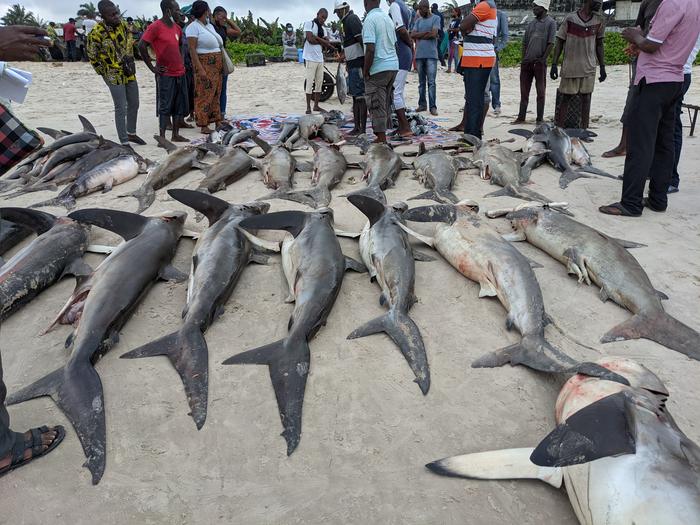Tens of thousands of endangered sharks and rays are caught by small-scale fisheries off the Republic of the Congo each year, new research shows.

Credit: Phil Doherty
Tens of thousands of endangered sharks and rays are caught by small-scale fisheries off the Republic of the Congo each year, new research shows.
Scientists surveyed fish brought ashore at Songolo, which is home to more than 60% of the country’s “artisanal” fishers (small boats, small engines, hand-hauled lines and nets).
In three years, the team – led by the University of Exeter in partnership with the Wildlife Conservation Society (WCS) Congo Program and the Republic of the Congo’s fisheries department – recorded more than 73,000 sharks and rays landed.
Most were juveniles, and 98% of individuals were of species listed as vulnerable, endangered or critically endangered on the IUCN Red List.
The researchers highlighted good news from the study: it shows the area is rich in sharks and rays, including two species previously thought to be locally absent – the African wedgefish and the smoothback angelshark.
And the findings could be used to protect wildlife while maintaining fishers’ livelihoods.
“The devastating impact of industrial fishing fleets is well documented, but much less is known about the importance of small-scale fisheries,” said lead author Dr Phil Doherty, from the Centre for Ecology and Conservation on Exeter’s Penryn Campus in Cornwall.
“These fishers depend on their catch for food and income, so we’re not here to tell them to stop fishing.
“Instead, by researching what they catch – including where and when – we can help to design measures that preserve shark and ray populations and ensure fishers’ livelihoods are sustainable.”
Dr Doherty said the dominance of juvenile sharks and rays in the catch represented a “triple threat” to fishers and biodiversity.
“It’s bad for fishers because these smaller animals have less meat, and smaller fins for the valuable fin market,” he said.
“Catching juveniles is also bad for the population, as these sharks would be the future breeding adults.
“Thirdly, the high number of juveniles suggests this area may be a nursery ground for some species – and fishing in such an area could be disastrous for them.”
He added: “Prolonged fishing by industrial fleets may have taken many of the larger individuals, meaning artisanal fishers have to settle for smaller ones.
“With many pressures faced by sharks and rays at different life stages, rapid population decline is highly likely.”
Researchers from Exeter and WCS supported the creation of the Republic of the Congo’s first Marine Protected Areas, which came into effect last year.
Dr Kristian Metcalfe, who has been working in the Republic of the Congo since 2013, said: “Buy-in, trust, cooperation and inclusion of the fishers and in-country researchers is the only way these projects can succeed, and the only way to generate important data – which is necessary to create effective management strategies.
“For example, we found many juvenile scalloped hammerhead and blacktip sharks are caught at a certain time each year, so limiting fishing for these species at that time could allow populations to begin to recover.
“Changing equipment, such as adjusting the mesh size of gillnets to allow non-target species to escape, may be effective – as well as proposing the release of easily identifiable species such as the endangered African wedgefish.”
The scalloped hammerhead (critically endangered) and blacktip shark (vulnerable) were the most-caught species in the study, with over 50,000 sharks from these species recorded.
As the survey did not take place every day (14 days per month on average), and more than 30% of the country’s artisanal fleet is based at locations other than Songolo, the true numbers of sharks and rays caught is likely to be significantly higher than the 73,268 observed in the study.
The study was funded by the Darwin Initiative, the Waterloo Foundation, the Waitt Foundation and the Save Our Seas Foundation.
The paper, published in the journal Conservation Science and Practice, is entitled: “Artisanal fisheries catch highlights hotspot for threatened sharks and rays in the Republic of the Congo.”
Journal
Conservation Science and Practice
DOI
10.1111/csp2.13017
Article Title
Artisanal fisheries catch highlights hotspot for threatened sharks and rays in the Republic of the Congo.
Article Publication Date
11-Oct-2023




